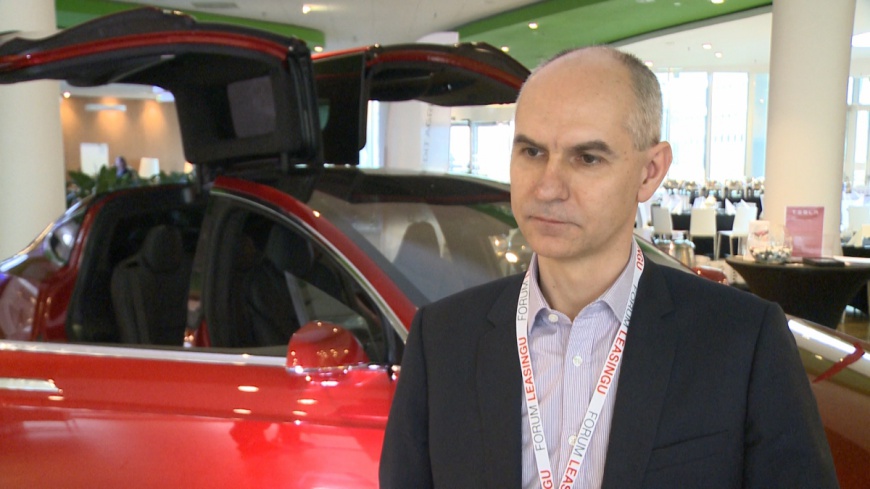| Says: | Radosław Kuczyński |
| Function: | President of the Management Board |
| Company: | EFL Leasing |
In Poland, the idea of car-sharing is likely to catch on sooner than electric cars. The number of cars may drop by as much as 80 percent.
In 2017, the sales of electric cars in Poland, including plug-in hybrid cars, slightly exceeded 1000 vehicles, compared to several thousand sold in Norway or Germany. Despite the incentives envisaged in the new legal act, and the dropping prices of electric cars, they will hardly become common elements of the Polish road landscape in the nearest years. The car-sharing trend is likely to catch on far more quickly, and may lead to a drop in the demand for car ownership by even 80 percent.
“The trends currently observed on the global market may be seen as reflecting the subsequent stages of automotive development. The first trend concerns electro-mobility, i.e. the construction of cars powered by electricity to replace vehicles using traditional fuels. The second trend concerns the emergence of fully-autonomous cars that will revolutionise our entire approach to transport and car-sharing. Once we get to the point of treating transport as a service, we will no longer need our own cars and the demand will fall by even 80 percent,” predicted Radosław Kuczyński, President of the EFL Leasing, in an interview with the Newseria Biznes news agency.
Local governments cannot effectively deal with challenges posed by the growing emissions of exhaust fumes, the shortage of parking places and traffic jams resulting from the ever-growing number of cars. Based on the October's report by the TOR Consultants Group and the Polish Organisation for Parking Industry, the number of cars in Polish cities has seen a four-fold increase since the 1990s. There are over 1.6 m cars registered in Warsaw ‒ a city with 1.74 m inhabitants, which gives over 900 cars per every 1000 residents. In Sopot or Olsztyn the number of registered vehicles exceeds the number of residents.
Car-sharing is expected to partly solve this problem. This idea has emerged from the sharing economy trend which has recently grown in popularity. The car rental system is common in many European countries, including Germany, France and Denmark. In Poland such services are available, inter alia, in Warsaw, Kraków and the Tricity.
“I believe that our Polish mentality, i.e. being accustomed to ownership, will hardly pose any problem, as it mainly concerns the older generation. Looking at young people's behaviours and habits, e.g. the ease of using such services as Uber or minute rentals, we get an impression that younger generations no longer feel the need to own a car,” Radosław Kuczyński said.
These changes are likely to influence, to some extent, also the lease industry.
“While facing a decreasing share of cars in the lease industry's financial structure, in all other industries we will see a tendency towards replacing humans with machines. The purchase of such machines will need to be financed from some sources. Speaking of the industry as a whole, we are not afraid of such financial structure changes. Briefly speaking, there will be fewer passenger cars but more machines and devices,” Radosław Kuczyński explained.
Cars powered by electricity as well as electro-mobility development, strongly supported by both the Polish government and private entities, may provide a response to the excessive pollutant emissions. Last year the government adopted the Electro-Mobility Development Plan and a new act regulating this domain. Work on a prototype of the first Polish electric car is also in progress.
Nonetheless, the President of the EFL Leasing has noted that, as compared to western European countries, the number of electric cars sold in Poland is still very low. In 2017, the sales of electric cars, including plug-in hybrids, merely exceeded 1000 vehicles, compared to tens of thousands sold in Norway or Germany. Also, the share of electric cars and plug-in hybrids in the Polish market is insignificant, revolving around 0.1 percent.
“This mainly results from the fact that there are very few incentives to purchase electric cars in Poland. Let’s take a look at what has happened on the western European or American markets. The countries offering support, usually through co-funded purchases of electric cars, have seen a growing popularity of such vehicles. Incentives are one of the elements that would certainly accelerate the shift towards electro-mobility in Poland. Such measures, however, must go hand in hand with the development of car charging infrastructure which is still very poor,” Radosław Kuczyński claimed.
In January, an electro-mobility Act was adopted, introducing a system of incentives for purchasers of electric cars. The government plans assume that by 2020 a network of 6,400 charging stations will be set up all over the country (including 400 fast-charging facilities and 6000 standard stations), along with over 100 CNG/LNG stations.
The President of the EFL Leasing has noted that relatively high prices of electric cars are currently one of the major purchase barriers. On the other hand, the use of such vehicles is much cheaper, compared to diesel- or gasoline-powered cars. According to the forecasts released by the International Energy Agency projections, which have been quoted in the Cambridge Econometrics and FPPE report, between 2020 and 2030 the entire costs of owning an electric and diesel- or gasoline-powered car, including the purchase, maintenance and use, are likely to level off.
“Electricity is cheaper than traditional fuels. Moreover, electric cars have much simpler structures and are less prone to failure. As a result, the use of such vehicles is much less expensive. Taking into consideration these two factors, and using such sources as lease or rental to finance the purchase, it turns out that the monthly charges for an electric car are no longer that substantial. Actually, an electric car is now not much more expensive than a traditional car if we consider all the running costs,” Radosław Kuczyński explained.
Trade

Polish consumers are more satisfied than Americans, with the customer satisfaction level being close to 80 percent
For six years the customer satisfaction index in Poland has grown by over 17 percentage points to nearly 78 percent, and it currently exceeds the customer satisfaction levels recorded in the USA and the United Kingdom. Service quality and its growing significance among businesses have had a tremendous impact on customer satisfaction. For the eleventh time the Customer Service Quality Star titles have been awarded to entrepreneurs recording the best results in this field.

